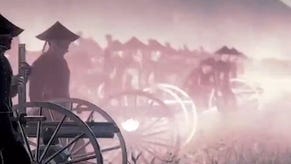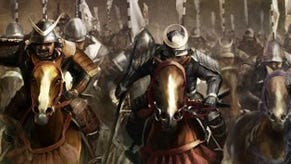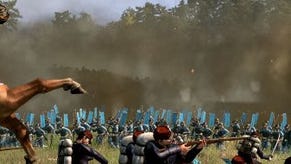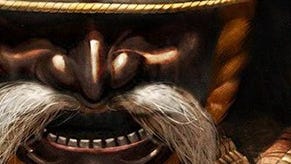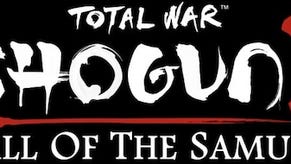Shogun 2 - Fall of the Samurai opens an easy door to RTS
Don't be left scrabbling to get on board the strategy bandwagon; jump on this "niche" genre now. Total War: Shogun 2 - Fall of the Samurai may be your best entry point.
I'm hopeless at strategy games of all kinds - absolutely appalling. Start talking about build orders and opening spreadsheets and I just lose it. I have no idea how to even approach either a grand strategy or a real-time battle - how do you begin to choose between all the available options? How do you know how to counter the enemy's plans? What does this number mean? Is an extra 5% meaningful? What's that enormous army doing there? Is that mine? Why does it say "game over"? Oh.
"We've done a whole new set of video tutorials this time, so new players to the series will have an idea of how the different units interact," The Creative Assembly's community manager Craig Laycock told me during a two-hour crash course on Fall of the Samurai, a stand-alone release serving as the latest expansion to Total War: Shogun 2.
"The learning curve is like that," he added, speaking of strategy in general and making an almost vertical gesture.
"That's actually one of the toughest things about making these strategy-like games; you want to make sure the barriers are as low as they can be, but then you don't want to annoy the hardcore players who actually quite like the fact that there's high [entry] barriers."
Like many strategy games, Fall of the Samurai employs an encyclopaedia which can be brought up with a simple right click, but while the masses of in-depth information so presented is great for the hardcore, it's a little overwhelming for beginners.
"We find brand new players don't like going into the encyclopaedia, which is why we did the video tutorials," Laycock agreed.
"We're trying to hold the player's hand a little bit, in terms of the rock, paper, scissors mechanic we had in Shogun 2, because it wasn't always clear what kinds of unit beat other kinds of unit."
If your experience of strategy sounds anything like mine, then you're probably likewise locked out of one of the most important and rapidly growing genres in the business. Shooters may be the mainstream multiplayer choice but in serious competition strategy is an established star - and increasingly spilling over to general gaming consciousness, thanks to MOBA and the StarCraft-driven resurgence of interest in RTS.
Total War is in one of the genre's most respected series. Despite being a PC exclusive in a hardcore genre, Total War: Empire debuted at the top of the US charts, and Total War: Shogun 2, sequel to the legendary title which started it all, popped up in fourth place in the UK in the same week as heavy-hitters Dragon Age 2 and Pokémon Black & White.
Not bad for a "niche" interest, right?
"That's where people like Blizzard are also helping us out. There's kind of a camaraderie there. They're going to be pushing to expand that market. We like to think we help them out there. There's a nice symbiosis on the PC side of things because there's so few strategy-only studios nowadays, it's kind of our responsibility to push it as much as possible," Laycock commented.
"The [Total War] series has continued to do well. There's more and more people buying it than ever before."
Today, we're expanding the market to me. For the uninitiated, Total War's signature formula combines grand strategy, in which you recruit and move units, improve towns, and manage diplomacy on a turn-based world map - alá Civilization - but hit the battlefield in real time, shifting units in a rapid dance of rock-paper-scissors dominance complicated by three dimensional terrain.
That means players have two different genres to learn; so Shogun 2 is a daunting package for the strategy newb. Fall of the Samurai, on the other hand, is a perfect starting point, with a lower price tag and the possibility of jumping into the broader community once you've got your feet wet.
"We've balanced it so with Fall of the Samurai, you can play against Shogun 2 players - so the community hasn't been divided up," Laycock explained.
"We didn't want to divide the multiplayer community. That doesn't make sense. However, if people who do own Fall of the Samurai do just want to play against other Fall of the Samurai units, then they can just tick a check box in the matchmaking section and do that."
That's an option you might want to take at first because the Total War community is as hardcore as they come - Fall of the Samurai's beta was opened to forum members and community websites, and drew 2,500 participants. The player base is almost a necessary aspect of development, helping to unravel the complexities of the game - complexities which are totally beyond me, it must be said. Although I'm baffled and confused, I desperately want to know more. It's like standing on the other side of the lolly shop window, staring wistfully at the wonders within. Fall of the Samurai is full of eye-candy, in fact, improving on the already notable graphical achievements of Shogun 2.
"Shogun 2 is the most scalable Total War game we've done, and I'm pretty sure the specs haven't increased for Fall of the Samurai,"
"We've changed some things around but it's mostly optimisations. We're constantly working on the graphics engine, making little tweaks, so any increased graphics don't come out in performance.
It doesn’t blink an eye when we enter a battle and watch hundreds of little men scamper about. Well, I say “little”, but this is Total War – you can zoom in close enough to see up their nostrils if you like, and the frame rate doesn’t even seem to twitch despite the overwhelming numbers.
"We've improved the trees. We've redone the map. I was playing the other day and my foreign agent grew a beard. I think the artists just snuck that in - so your characters will get older as their abilities increase."
I have no idea what sort of über rig is humming away under the table, although I cajole Laycock into showing me the perfectly serviceable and indeed quite attractive minimum settings as well as ultra, but it doesn't blink an eye when we enter a battle and watch hundreds of little men scamper about. Well, I say "little", but this is Total War - you can zoom in close enough to see up their nostrils if you like, and the frame rate doesn't even seem to twitch despite the overwhelming numbers.
"Previously you could only handle 20 vs 20 unit battles; the reason we didn't do more than that in the past is that it actually gets very tricky for a user to control more than that. But because the community has been asking for it for so long and we didn't want to patronise them and restrict them, now we've got it so if you've got 20 units in a stack, and you have another stack reinforcing, you can control the reinforcing army as well," Laycock advised me.
40 units, each composed of dozens of individual soldiers, on screen at once; this visual deliciousness is strongly appealing, but Fall of the Samurai's rapid pace - enemy turns have been so optimised that dozens of AI opponents flash by in mere seconds - is another feather in its cap. Laycock shows me a tricky naval battle in which the deceptively ponderous ships whizz about the place, firing torpedoes and cannons. It's quite easy to simply steer your ships into each other if you let your mind wander for even a second, as in a third-person firing mode - not exactly the dry-dust, text-heavy experience that comes to many minds when the word "strategy" pops up.
Laycock is very patient with me, even when I won't stop gleefully exclaiming over non-essential aesthetics ("Oh look, he's put down a little chair to show he's moved this turn!") and I feel a nagging guilt that it's me here quizzing him, and not someone so well-versed in this genre that their incisive questions uncover deep truths of vital import to the established fanbase, like whether this or that has been nerfed. On the other hand, the established fanbase is waiting in the wings, credit cards at the ready or not - nothing I could report will change their minds.
My mind, on the other hand, is starting to tick over madly. "Shouldn't you have used your agent that turn," I suggest, and later, when Laycock's jetlagged speed playthrough produces slightly less stellar results, I scold him for sending his units into a bottleneck, trapping his commander.
The elegant user interface is starting to resolve from a hot mess into something I comprehend without panicking; my extremely vague knowledge of tactics - hold the high ground! - is prodding me; my secret megalomania is insisting that I should be the one at the keyboard, with an eye for the conquest of Japan.
Sign me up, Sega. I'm sold.




